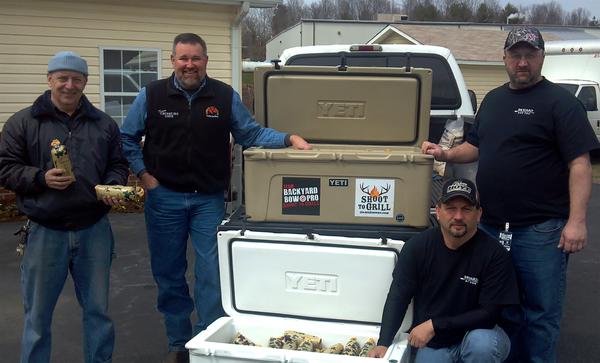General Information
Two programs in North Carolina address food insecurity through the legal harvest of whitetail deer. These organizations connect landowners, hunters, and meat processors with food banks and pantries. Hunters can join these organizations and hunt in cooperation with local landowners, farmers, and gated communities to control the deer population. Partnerships with designated, state-inspected meat processors allow the hunters to deliver deer to be processed, and they also allow the ground venison to be packaged and distributed to area food security organizations. Membership fees, business partnerships, and fundraising pay for the meat processing. In North Carolina, the two organizations that facilitate the donation of venison to food banks are the North Carolina Hunters for the Hungry (NCHFTH) and Backyard Bow Pro (BBP). These organizations vary in their operation and membership procedures. Hunters involved with Backyard Bow Pro pay a membership fee and take several steps, including a background check and a hunting proficiency test, to become members. Through Hunters for the Hungry, community organizations can become donation drop-off points by allowing the use of their commercial refrigeration to facilitate the collection of venison from participating hunters.
How Cooperative Extension Can Be Involved
- Coordinate with Farmers. Cooperative Extension can play an important role in these programs by connecting farmers who are experiencing damage caused by deer with hunters who are part of the programs.
- Provide Nutrition Education and Recipes. Cooperative Extension agents and Extension Master Food Volunteers can ensure that food pantry clients know how to enjoy venison by providing nutritional education or recipes for the use of ground venison. For example, ground venison can be substituted for ground beef in the chili recipe from the Expanded Food and Nutrition Education Program (EFNEP), as well as in most EFNEP recipes that call for ground beef.
Additional Resources
- North Carolina Hunters for the Hungry
- Backyard Bow Pro
- Processors affiliated with N.C. Hunters for the Hungry
Publication date: Nov. 8, 2017
LF-15
Other Publications in Farm to Food Bank Resource Guide for North Carolina Cooperative Extension
The use of brand names in this publication does not imply endorsement by NC State University or N.C. A&T State University of the products or services named nor discrimination against similar products or services not mentioned.
N.C. Cooperative Extension prohibits discrimination and harassment regardless of age, color, disability, family and marital status, gender identity, national origin, political beliefs, race, religion, sex (including pregnancy), sexual orientation and veteran status.

